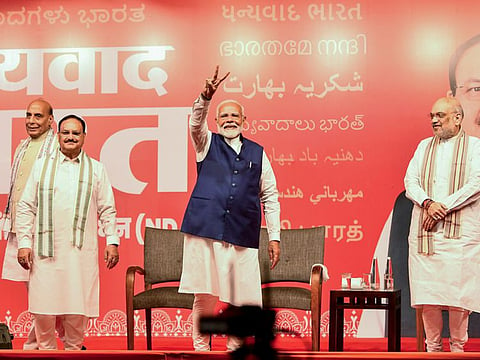Modi-led alliance says it will form next Indian government
Modi unanimously chosen as the leader of the alliance

New Delhi: The Hindu-nationalist party of Narendra Modi agreed with allies Wednesday to form a government after a general election in which it failed to secure an outright majority for the first time in a decade.
The 15-member National Democratic Alliance (NDA) coalition — led by Modi’s right-wing Bharatiya Janata Party (BJP) —has 293 seats in parliament, giving it control of the legislature.
“We all unanimously choose respected NDA leader Narendra Modi as our leader,” a BJP-issued alliance statement said.
It said the NDA government would “preserve India’s heritage” and work for the “all-round development of the country”.
Election results released Tuesday upended conventional wisdom throughout the six-week election that Modi’s Hindu nationalist agenda would power him to a landslide win.
Analysts said Modi’s reliance on coalition partners means he faces the prospect of a far tougher-than-expected third term.
“It will force Modi to take the point of view of others — we shall see more democracy and a healthy parliament,” said Nilanajan Mukhopadhyay, who has written a biography of Modi.
“He will have to be a leader that he has never been; we will have to see a new Modi.”
Indian media reports said Modi would be sworn in as prime minister on Saturday.
‘Strong opposition’
China congratulated Modi earlier on Wednesday and said it was “ready to work” with its neighbour, while Japan also applauded the win.
Modi, 73, insisted on Tuesday night that the election results were a victory that ensured he would continue his agenda.
“Our third term will be one of big decisions and the country will write a new chapter of development,” Modi told a crowd of cheering supporters in the capital New Delhi after his win. “This is Modi’s guarantee.”
The BJP secured 240 seats in parliament, well down on the 303 from five years ago and 32 seats short of a majority on its own.
The main opposition Congress party won 99 seats in a remarkable turnaround, almost doubling its 2019 tally of 52.
“The country has said to Narendra Modi ‘We don’t want you’,” opposition leader Rahul Gandhi told reporters after the results were released, saying people had given “the right response”.
Commentators and exit polls had projected an overwhelming victory for Modi, who critics have accused of leading the jailing of opposition figures and trampling on the rights of India’s 200-million-plus Muslim community.
In a personal sting, Modi was re-elected to his constituency representing the Hindu holy city of Varanasi with a far lower margin of 152,300 votes. That compared with nearly half a million votes five years ago.
‘Constant worry’
Now dependent on coalition partners, the BJP must seek consensus to push its policies through parliament.
“The lurking possibility of them using their leverage, encouraged further by feelers from Congress and others in the opposition, is going to be a constant worry for BJP,” the Times of India reported.
Modi now has to “suffer the fate of working with an alliance partner... who could pull the plug at any time”, said Hartosh Singh Bal, political editor of The Caravan magazine in New Delhi.
Stocks slumped Tuesday on speculation the reduced majority would hamper the BJP’s ability to push through reforms.



